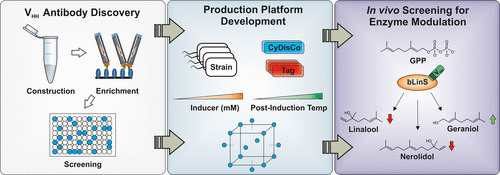当前位置:
X-MOL 学术
›
ACS Synth. Biol.
›
论文详情
Our official English website, www.x-mol.net, welcomes your
feedback! (Note: you will need to create a separate account there.)
Exploiting Single Domain Antibodies as Regulatory Parts to Modulate Monoterpenoid Production in E. coli.
ACS Synthetic Biology ( IF 3.7 ) Pub Date : 2020-09-14 , DOI: 10.1021/acssynbio.0c00375 Jonathan Wilkes 1 , Anthony Scott-Tucker 2 , Mike Wright 2 , Tom Crabbe 2 , Nigel S Scrutton 1
ACS Synthetic Biology ( IF 3.7 ) Pub Date : 2020-09-14 , DOI: 10.1021/acssynbio.0c00375 Jonathan Wilkes 1 , Anthony Scott-Tucker 2 , Mike Wright 2 , Tom Crabbe 2 , Nigel S Scrutton 1
Affiliation

|
Synthetic biology and metabolic engineering offer potentially green and attractive routes to the production of high value compounds. The provision of high-quality parts and pathways is crucial in enabling the biosynthesis of chemicals using synthetic biology. While a number of regulatory parts that provide control at the transcriptional and translational level have been developed, relatively few exist at the protein level. Single domain antibodies (sdAb) such as camelid heavy chain variable fragments (VHH) possess binding characteristics which could be exploited for their development and use as novel parts for regulating metabolic pathways at the protein level in microbial cell factories. Here, a platform for the use of VHH as tools in Escherichia coli is developed and subsequently used to modulate linalool production in E. coli. The coproduction of a Design of Experiments (DoE) optimized pBbE8k His6-VHHCyDisCo system alongside a heterologous linalool production pathway facilitated the identification of anti-bLinS VHH that functioned as modulators of bLinS. This resulted in altered product profiles and significant variation in the titers of linalool, geraniol, nerolidol, and indole obtained. The ability to alter the production levels of high value terpenoids, such as linalool, in a tunable manner at the protein level could represent a significant step forward for the development of improved microbial cell factories. This study serves as a proof of principle indicating that VHH can be used to modulate enzyme activity in engineered pathways within E. coli. Given their almost limitless binding potential, we posit that single domain antibodies could emerge as powerful regulatory parts in synthetic biology applications.
中文翻译:

利用单域抗体作为调控部分来调节大肠杆菌中的单萜类化合物的产生。
合成生物学和代谢工程为生产高价值化合物提供了潜在的绿色和有吸引力的途径。提供高质量的部件和途径对于使用合成生物学进行化学品生物合成至关重要。虽然已经开发了许多在转录和翻译水平上提供控制的调控部分,但在蛋白质水平上存在的调控部分相对较少。单域抗体 (sdAb),如骆驼重链可变片段 (V HH ) 具有结合特性,可用于开发和用作在微生物细胞工厂中在蛋白质水平调节代谢途径的新部分。在这里,一个使用 V HH作为大肠杆菌工具的平台开发并随后用于调节大肠杆菌中的芳樟醇生产。实验设计 (DoE) 优化的 pBbE8k His 6 -V HH CyDisCo 系统以及异源芳樟醇生产途径的联合生产促进了抗 bLinS V HH的鉴定,该抗 bLinS V HH可作为 bLinS 的调节剂。这导致所获得的芳樟醇、香叶醇、橙花醇和吲哚的滴度发生改变和显着变化。在蛋白质水平以可调方式改变高价值萜类化合物(如芳樟醇)的生产水平的能力可能代表着改进微生物细胞工厂发展的重要一步。本研究作为原理证明,表明 VHH可用于调节大肠杆菌工程途径中的酶活性。鉴于它们几乎无限的结合潜力,我们认为单域抗体可能会成为合成生物学应用中强大的监管部分。
更新日期:2020-10-17
中文翻译:

利用单域抗体作为调控部分来调节大肠杆菌中的单萜类化合物的产生。
合成生物学和代谢工程为生产高价值化合物提供了潜在的绿色和有吸引力的途径。提供高质量的部件和途径对于使用合成生物学进行化学品生物合成至关重要。虽然已经开发了许多在转录和翻译水平上提供控制的调控部分,但在蛋白质水平上存在的调控部分相对较少。单域抗体 (sdAb),如骆驼重链可变片段 (V HH ) 具有结合特性,可用于开发和用作在微生物细胞工厂中在蛋白质水平调节代谢途径的新部分。在这里,一个使用 V HH作为大肠杆菌工具的平台开发并随后用于调节大肠杆菌中的芳樟醇生产。实验设计 (DoE) 优化的 pBbE8k His 6 -V HH CyDisCo 系统以及异源芳樟醇生产途径的联合生产促进了抗 bLinS V HH的鉴定,该抗 bLinS V HH可作为 bLinS 的调节剂。这导致所获得的芳樟醇、香叶醇、橙花醇和吲哚的滴度发生改变和显着变化。在蛋白质水平以可调方式改变高价值萜类化合物(如芳樟醇)的生产水平的能力可能代表着改进微生物细胞工厂发展的重要一步。本研究作为原理证明,表明 VHH可用于调节大肠杆菌工程途径中的酶活性。鉴于它们几乎无限的结合潜力,我们认为单域抗体可能会成为合成生物学应用中强大的监管部分。











































 京公网安备 11010802027423号
京公网安备 11010802027423号